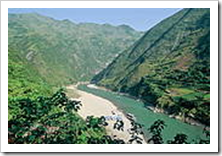21 Aug 2008
Managers and stakeholders in freshwater systems need to stop talking about adaptation to climate change and start doing it, WWF told the World Water Week symposium in Stockholm today.

The global conservation group presented a series of case studies from four continents showing that measures to improving the health of stressed water systems now would improve their ability to cope with projected climate impacts in the future.
"There are no regrets to many of the actions we can take now," said WWF freshwater researcher Jamie Pittock. "We are talking about improving river management and restoring the flood holding and drought proofing services of flood plains and wetlands, all of which can be shown to have short term economic, social and environmental pay-offs.
"The fact that they help climate-proof our river basins now is an added benefit."
Launching the new WWF report Water for life: Lessons for climate change adaptation from better management of rivers for people and nature at World Water Week, Mr Pittock said climate adaptation strategies that neglected freshwater systems were asking for trouble.
"Setting biofuel targets without considering where the water to grow biomass crops will come from is a recipe for a worsening water crisis in many regions and freshwater systems less able to cope with extreme weather events," Mr Pittock said.
"More dams for hydropower is a recipe for even more fragmented rivers that will inhibit freshwater species - the food for millions - adapting to climate impacts by migrating up or down river systems."
WWF field studies show that work already begun on opening up Danube River floodplains and wetlands and reconnecting lakes to the river is improving fishing and drinking water availability, bringing back birds and reducing vulnerability to floods.
"Restoration of the 37 sites that make up the Lower Danube Green Corridor is estimated to cost €183 million, compared to damages of €396 million from the 2005 flood and likely earnings of €85.6 million per year," Mr Pittock said. "This is adaptation to climate impacts even if it is not planned or labeled as adaptation."
Perrenial flows in Tanzania's Great Ruaha River stopped in 1993 after years of declining rainfall and increasing water extractions, putting at risk important hydropower generation and tourism and reducing livelihoods for low income upstream and downstream communities.
The establishment of local water users associations and their work in restoring catchments, rescheduling diversions by major agricultural enterprises and the shutting off of illegal diversions resulted in year round river flows to the important Ihefu wetlands beginning again in 2004, with improved water security and livelihood opportunities to local communities.
Restoration of silted-up and abandoned water tanks used from around 1200 years ago to collect monsoon waters in a tributary area of India's Godavari River is lifting depleted groundwater levels, bringing dried out wells back into service and improving soil fertility and crop yields for disadvantaged farmers. Scaling up the project to cover all tanks in the area would cost $US 635 million to store about the same amount of water as a projected dam project costing $US 4 billion with significant adverse social and environmental impacts.
"This is adaptation that involves and respects the needs of local communities and people and provides immediate benefits, Mr Pittock said.
And in China's central Yangtse, WWF began working with local communities in 2002 to reconnect lakes and wetlands to absorb flood flows and counter sever pollution linked with increased heat and droughts.
Other benefits have been an increased variety and quantity of fish and improved access to safe water for communities.
"Our studies show that it is often a disaster that leads to the river restoration activities that will increase resilience to climate impacts," Mr Pittock said. "It would make more sense to avoid or reduce the impact of disaster by restoring and strengthening our river systems now.
WWF also released an overview on climate change adaptation for freshwater systems, as a guide to planners and managers.
The author of the guide, Dr John Matthews, said "Uncertainty is no reason for not acting on climate change impacts on vital water systems. We are certain there will be significant impacts even if we can't put as many decimal points on them as we would like to."
Notes:
• Adapting Water to a Changing Climate: An Overview by Dr John Matthews & Dr. Tom Le Quesne.
• Water for life: Lessons for Climate change adaptation from better management of rivers for people and nature by Jamie Pittock.
For further information:
Jamie Pittock – Mob: +61 407 265 131, e-mail: jpittock@wwf.org.au
Dr John Matthews – Tel: +1 202 203 8957, e-mail: john.matthews@wwfus.org
Phil Dickie – Mob: +41 79 703 1952, e-mail: pdickie@wwfint.org
About WWF
WWF, the global conservation organization, is one of the world's largest and most respected independent conservation organizations. WWF has a global network active in over 100 countries with almost 5 million supporters.
WWF's mission is to stop the degradation of the earth's natural environment and to build a future in which humans live in harmony with nature, by conserving the world's biological diversity, ensuring that the use of renewable natural resources is sustainable, and promoting the reduction of pollution and wasteful consumption.
0 comments:
Post a Comment